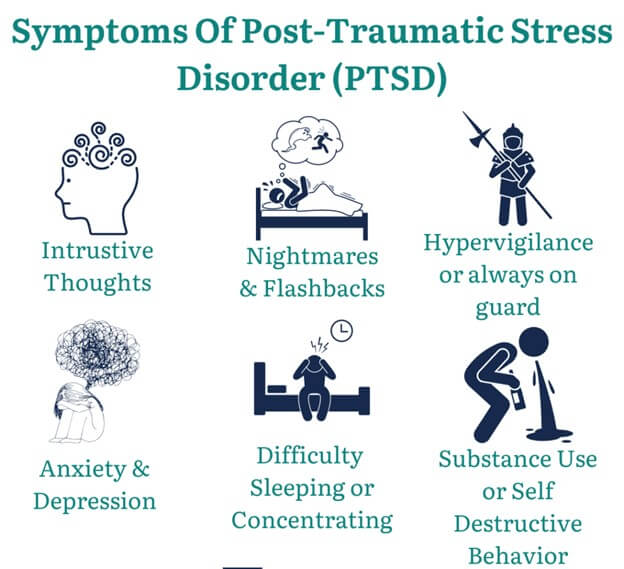A nurse is caring for a client who was involved in heavy combat and observed war casualties. The nurse should suspect that the client is suffering from posttraumatic stress disorder (PTSD) if the client makes which of the following statements?
"My child was born with a birth defect due to an exposure I had overseas."
I check any room I enter because the enemy is still after me and could be hiding anywhere."
"In my dreams, all I can see are the wounded reaching out and trying to grab me."
"I killed four enemy soldiers with my bare hands and saved my entire battalion."
The Correct Answer is C
A) "My child was born with a birth defect due to an exposure I had overseas."
This statement does not directly relate to the core symptoms of PTSD. While exposure to trauma can have a variety of consequences, including potential exposure-related health issues, this statement does not necessarily indicate the re-experiencing, avoidance, or hyperarousal symptoms characteristic of PTSD.
B) "I check any room I enter because the enemy is still after me and could be hiding anywhere."
This statement is more indicative of hyperarousal and hypervigilance, which are common symptoms of PTSD. However, it does not explicitly involve re-experiencing the traumatic event through nightmares or intrusive memories, as described in the correct answer.
C) "In my dreams, all I can see are the wounded reaching out and trying to grab me."
Explanation:
The statement "In my dreams, all I can see are the wounded reaching out and trying to grab me" indicates symptoms commonly associated with posttraumatic stress disorder (PTSD). This statement reflects the re-experiencing symptom cluster of PTSD, where individuals may have distressing and intrusive memories, nightmares, or flashbacks related to the traumatic event they experienced. The imagery of wounded individuals trying to grab the person suggests a strong emotional impact and ongoing distress related to the traumatic experience.
D) "I killed four enemy soldiers with my bare hands and saved my entire battalion."
While this statement might reflect exposure to a traumatic event and could contribute to symptoms of PTSD, it is presented in a way that seems more like a narrative of heroic actions rather than a symptom of distress or re-experiencing.

Nursing Test Bank
Naxlex Comprehensive Predictor Exams
Related Questions
Correct Answer is A
Explanation
Remaining with the client provides support and ensures their safety. The client's behavior indicates distress, and having a nurse nearby can help the client feel more comfortable and secure.
B. Give the client a PRN sleeping medication:
Explanation: Administering a sleeping medication should not be the first response, especially if the client is agitated. It's important to address the underlying cause of the agitation and consider other interventions before resorting to medication.
C. Encourage the client to go back to bed:
Explanation: Encouraging the client to go back to bed might not be effective if they are experiencing significant distress or anxiety. It's better to address their emotional state first before suggesting any changes in activity.
D. Explore alternatives to pacing the floor with the client:
Explanation: This is a reasonable course of action. Exploring alternatives to the client's current behavior can help address their distress and find ways to manage their emotions more effectively.
Correct Answer is C
Explanation
A) "I haven't gotten my period yet, and all my friends have theirs."
While the concern about not having gotten her period yet is a valid one, it's a common experience during adolescence. Variability in the timing of puberty is normal, and addressing this concern might involve providing reassurance and education about the natural range of development.
B) "There's a big pimple on my face, and I worry that everyone will notice it."
While concerns about physical appearance are common during adolescence, they are less urgent in terms of emotional and psychological well-being. Addressing body image issues is important, but the statement about lack of social acceptance and reciprocal liking indicates potentially deeper emotional challenges.
C) "None of the kids at this school like me, and I don't like them either."
Explanation:
Adolescence is a time of significant emotional and social development. The statement about not being liked by other students and not liking them in return indicates potential social isolation and difficulties in forming positive relationships. Adolescents often seek social acceptance and peer relationships are crucial for their well-being and development.
D) "My parents treat me like a baby sometimes."
This statement suggests a common parent-adolescent dynamic where there might be conflicts about independence and autonomy. While these feelings are valid, they don't necessarily reflect a higher priority concern related to social isolation and peer relationships.
Whether you are a student looking to ace your exams or a practicing nurse seeking to enhance your expertise , our nursing education contents will empower you with the confidence and competence to make a difference in the lives of patients and become a respected leader in the healthcare field.
Visit Naxlex, invest in your future and unlock endless possibilities with our unparalleled nursing education contents today
Report Wrong Answer on the Current Question
Do you disagree with the answer? If yes, what is your expected answer? Explain.
Kindly be descriptive with the issue you are facing.
